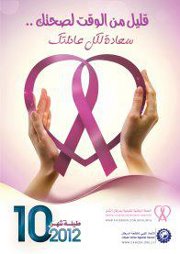By Nihal Zaroug.

(via http://www.facebook.com/BCAwarenessbenghazi )
Tripoli, 2 October:
“The National Campaign For Raising Awareness of Breast Cancer” in Benghazi, orgnaised a march yesterday, 1 October, . . .[restrict]to mark the month-long event that aims to increase awareness and promote early detection of the disease.
This is the first time that Libya, partakes in the annual international health campaign known as Breast Cancer Awareness Month. On 24 October, the event organisers have plans for Pink Hijab Day, another international awareness campaign founded by Libyan-American Hend El-Buri, which aims to promote women in Islam, and aims to overcome breast cancer as a taboo subject in Muslim societies.
The campaign kick-off started with a walk from Al-Katiba to Tibesti Hotel, which was organised by both women and men, an important achievement in itself, as cancer and more so breast cancer, are not openly discussed in public.

Cultural constraints and educational limitations have been citied as obstacles in seeking medical treatment for Libyan patients. Routine breast screening is not widely practiced, nor do doctors encourage it. In actuality, most doctors do no perform breast exams during routine patient visits. If early detection were part of a national health plan, breast cancer would mostly be observed in postmenopausal patients, as is the case in European and North American countries, where routine screening for breast cancer is encouraged and easily available.
However, in Libya, breast cancer when compared to other cancers, occurs at a relatively younger age and contributes to a higher proportion of female cancer patients in the age group 15 to 34, with a peak occurrence in the age group 44 to 49. Furthermore, the vast majority of cases studied were in their advanced stage, signalling a late or improper diagnosis of the disease in patients.
Breast cancer affects both genders, but is more prevalent and fatal in females. Globally, one in eight women will be diagnosed with breast cancer in their lifetimes. In Libya, breast cancer represents one-third of cancers in females, making it the commonest type in all female cancer patients.
These findings were published in the First Annual Population Based Cancer Registry Report, although this data was published in 2006, little progress has been achieved in cancer prevention since. However, a slow increase in breast cancer cases has been accredited to improved diagnostic practices, which demonstrates that early detection – which is central to the purpose of this awareness campaign – is among the best protections against the disease. [/restrict]








